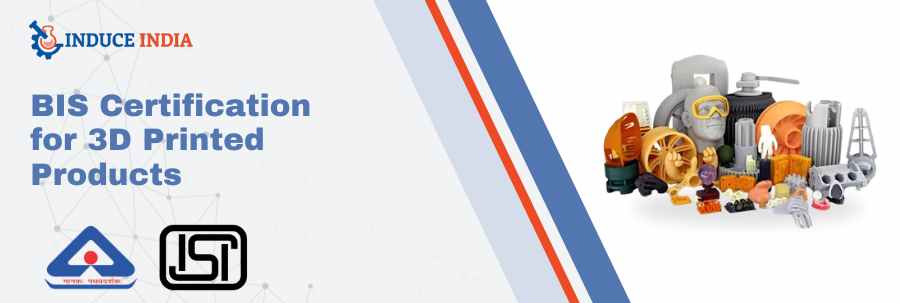The Bureau of Indian Standards or BIS certification is a regulatory body that is responsible for the harmonious development of activities of standardization, marketing, and quality certification of goods and for matters connected in addition to that or incidental there to.
In the year 1987, the Indian Standard Institute (ISI) transformed and was bestowed with the new title of Bureau of Indian Standard (BIS). The official symbol given by the BIS to manufacturers is called the ISI Mark.
This mark indicates that a product meets the standard set by the Indian government. You can understand it as a stamp of approval for industrial goods.
Manufacturers are not allowed to use the ISI mark until and unless the product passes the required tests and certifications by the BIS.
Other than this, manufacturers are also not allowed to manufacture, sell, or import goods till the time their product gets BIS approval.
Similar to other products, 3D printed products also require BIS certification. You can visit the official website of BIS to check the list of product categories to confirm whether your products require BIS certification or not.
The main motive of BIS is to eliminate and prohibit hazardous, unsafe, and low-quality products from entering the Indian borders. Since customers are well aware of the importance of the BIS mark on a product, they are reluctant to trust products that lack this mark of assurance, safety, and purity.
Why is the BIS Registration Process Important for 3D Printed Products?
The main reason for obtaining BIS certification for 3D printed products is to demonstrate the quality and safety of your products, as well as to allow for manufacturing, selling, and importing them in the Indian market. However, manufacturers may also need to obtain this certification for other reasons as well which are mentioned below.
- Assured Quality: BIS certification ensures that all the products meet the safety and quality standards set by Indian standards keeping consumers safe from hazardous and low-quality products.
- Regulatory Compliance: Getting BIS certification helps manufacturers meet the national regulations honestly without any legal practices.
- Market access: BIS certification is considered a golden ticket for entering the Indian market. This is said because certified products get more attention and trust from the customers and save you from legal issues. They also help in expanding your market reach.
- Consumer safety: Since BIS allows safe and best quality 3D printed products in the market, it keeps the customers safe from defective and unsafe ones. The BIS testing and evaluation involves a rigorous testing process that needs to be passed without any errors.
- Competitive advantage: Having a BIS mark on the products is similar to an achievement that makes you different from the competitors.
Steps to Obtain BIS Certification for 3D Printed Products
Application Submission
The very first step in obtaining BIS certification for 3D printed products is application submission. Submit the application either from the online portal or the BIS office along with the necessary documents, which include product details, manufacturing process, and quality control measures.
Product Testing
As soon as your application is submitted, the next step is to send your product for testing in the BIS-authorised laboratory for thorough testing. Here it is checked whether your product meets the specific standards of safety and quality.
Factory Inspection
Along with the product testing, or after the product testing, BIS officials conduct an onsite inspection in the manufacturing facility to make sure that everything including the production process meets the quality and safety standards.
Certification Decesion
Based on the application, test results, and inspection, if everything looks fit and fine to the BIS officials, you are given the BIS certification.
Marking and Labeling
Once you have attained the certification, you need to show the ISI mark on your product packaging. Yu products must be marked with the BIS standard mark to prove their quality and safety.
What are the challenges Faced by Manufacturers?
Although the steps of acquiring BIS certification are simple, during its execution manufacturers may face some challenges which are sometimes frustrating and require proper guidance, Below are some of the challenges discussed.
- Standard Development: 3D printing technology is comparatively new hence developing specific standards for various 3D printed products can be challenging.
- Continuous compliance: Maintaining BIS certification requires ongoing compliance with standards, regular audits, and updates to accommodate technological advancements.
- Cost and time: The certification process is time-consuming and costly, inspection and product testing may take more than expected time, whereas errors in an application can also lead to rejection of the application causing further delay.
Conclusion
In conclusion, BIS certification is an important element for manufacturers to manufacture, sell, and import products in the Indian market. They need to understand, that to gain the confidence of Indian customers, it is essential to show the safety and quality of your products which is only possible by acquiring BIS certification.
It is very common for the manufacturer to face different challenges during the BIS registration process. To overcome those challenges, they can get assistance from Induce India, a BIS consultant company that helps domestic and foreign manufacturers provide BIS registration and other important certifications.



